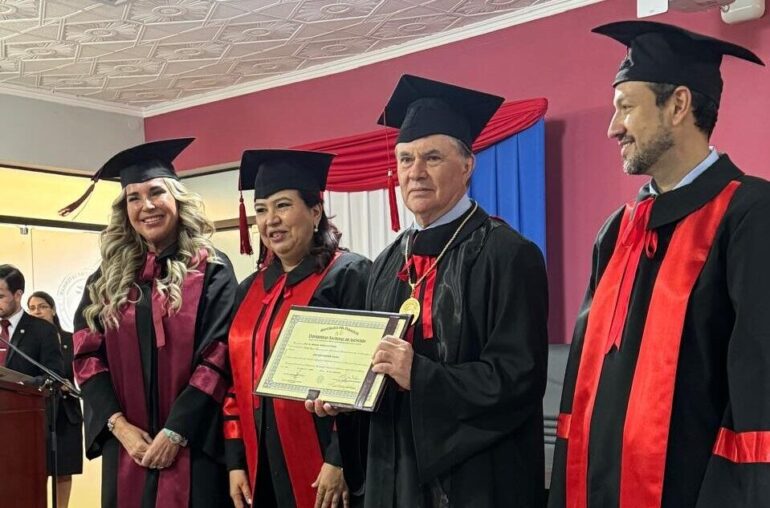The Director General of the Inter-American Institute for Cooperation on Agriculture (IICA), Manuel Otero, received an Honorary Doctorate from the National University of Asunción (UNA), in a ceremony held in the Paraguayan capital that was attended by a large number of representatives of Paraguay’s agricultural sector.
The recognition from UNA, presented by Rector Zully Veras and based on the “invaluable contributions of the Argentine veterinarian to the agricultural development of the region,” was made in a ceremony in the library of that university, populated by government representatives and authorities from the academy and local agricultural institutions.
At the event, the dean of the Faculty of Veterinary Sciences (FCV), Viviana Ríos, discussed Otero’s extensive career, dating back to the 1980s when he was first agricultural attaché for his country, Argentina, at the Embassy in Washington, and then began a career at IICA that led him to work in virtually all countries on the American continent.
“Today, the recognition of the life and work of a great personality is crystallised. With this act, the academic community officially and at the highest level recognises the contribution to the construction and dissemination of knowledge, the promotion of human values and the contribution in specific areas of the person who is today worthy of this high distinction,” said the Dean of the FCV.
The event was attended by Vice Ministers Rossana Carolina Ayala Torres and Marcelo Andrés González Ferreira, from the Ministry of Agriculture and Livestock of Paraguay; ambassadors from Latin American and Asian countries; the UN Resident Coordinator in Paraguay, Igor Garafulic; the livestock entrepreneur and IICA Goodwill Ambassador, Maris Llorens; and the OAS Representative in Paraguay, Pablo Sandino Martínez Cardozo; among other authorities.
Otero, accompanied by the IICA Representative in Paraguay, Gabriel Rodríguez, and his wife, architect Amanda Fernández, after accepting the title of Doctor Honoris Causa from the hands of Rector Veras, delivered a message that began with a greeting in Guaraní, thanked the UNA for its recognition and attributed the success of his management at IICA “to the collaborative and dedicated work of professionals from various countries whom I have had the privilege of leading for 7 years.”
Otero also gave his perspective on agricultural activity and its connection with the global agenda, and the role of knowledge, science and innovation.
“It is essential to recognise the role of the university in the training of human resources and new and renewed leaders for the agricultural and rural development of our region,” he said. In this regard, he stated that “it is necessary to rethink agriculture from an innovative, sustainable perspective, placing farmers at the center of all our efforts, a new paradigm that offers great opportunities, but also unprecedented challenges, which we must address with a vision for the future.”
Paraguay’s agricultural challenges
The Director General of IICA also referred to the situation of Paraguay, an emerging agricultural power, in the new context. The country, according to Otero’s analysis, is in a privileged position to face the inevitable future of increased global food demand, and the significant transformations it has experienced in recent years have catapulted it into an increasingly important player on the global agrifood scene.
In this context, the implementation of advanced biotechnology and the adoption of sustainable agricultural practices have significantly boosted the production of cereals and oilseeds, such as corn and soybeans, placing Paraguay in relevant positions, both in terms of production and exports, a development that has strengthened the national economy.
“The synergy between new genetic materials and regenerative agriculture methods has allowed us to increase productivity while preserving natural resources, establishing a model of sustainable agricultural development,” said Otero, also recalling that, in the meat sector, Paraguay is among the top 10 world exporters, standing out for its high standards of quality and health.
The country has also made progress in rice and wheat production, of which it is already a net exporter. “The present and future challenge for Paraguay lies in continuing to increase agricultural production, while optimising the use of resources and strengthening sustainability. The bioeconomy is emerging as a key tool to reconcile productivity with environmental preservation, transforming rural areas and their territories into epicentres of innovation and progress. It is imperative to improve the living conditions of small farmers, encourage the active inclusion of young people and women in the sector, and add value to export products,” he concluded.


